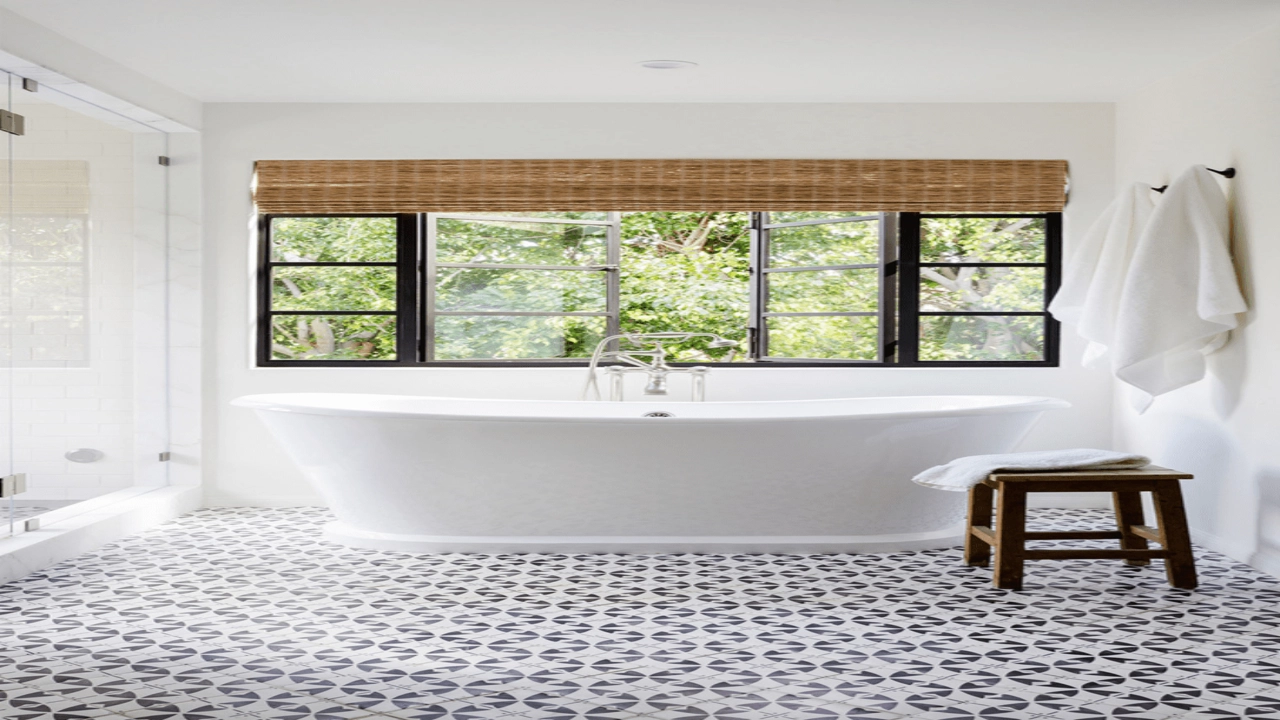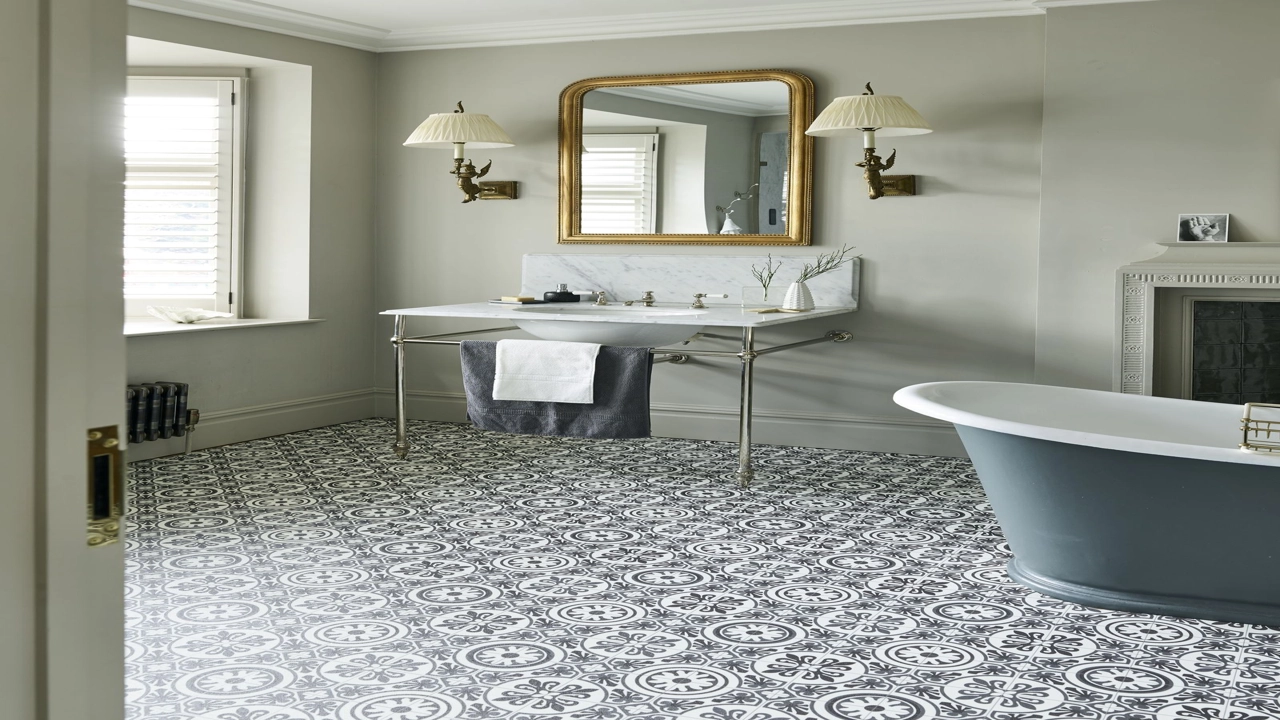Best bathroom floor tile material selection depends on your needs. Porcelain offers durability and water resistance, making it a popular choice. Natural stone, like marble or slate, adds elegance but requires more maintenance.
Ceramic tiles provide a budget-friendly option with various styles. Consider your lifestyle and budget when choosing. Each material offers unique advantages. Proper installation is key regardless of your choice.
Upgrade Your Bathroom Best Floor Tile Choices

Choosing the right bathroom floor tile material is crucial. It needs to withstand moisture, foot traffic, and the occasional spill. You want something beautiful, durable, and easy to maintain. Let’s explore some excellent options to help you find the best bathroom floor tile material for your needs.
Porcelain Tile
Porcelain tile stands out as a top contender for the best bathroom floor tile material. Its dense, non-porous nature makes it incredibly resistant to water damage, a critical factor in a high-humidity environment like a bathroom. It’s also extremely durable, able to withstand heavy foot traffic without chipping or cracking. Available in a vast array of colors, styles, and finishes, porcelain tile offers impressive versatility. You can find options that mimic natural stone, wood, or even concrete, giving you considerable design freedom. Cleaning porcelain is straightforward; a simple sweep or mop usually suffices. Many higher-end porcelain tiles boast stain resistance as well. Consider the potential for slipping, especially with glossy finishes. While generally durable, porcelain can chip if subjected to significant impact.
Features:
- Highly water-resistant
- Durable and long-lasting
- Variety of colors and styles
- Easy to clean
- Relatively easy to install
Pros:
- Excellent durability
- Water resistance protects against damage
- Wide design choices
- Low maintenance
Cons:
- Can be expensive
- Can be cold underfoot
- Can chip if dropped objects impact the surface
- Some finishes can be slippery when wet
Ceramic Tile
Ceramic tile represents a more budget-friendly alternative to porcelain, while still providing many of the same benefits. It’s also a good choice for the best bathroom floor tile material because it is water-resistant and relatively easy to clean. While not as dense as porcelain, ceramic tiles offer good durability for most bathroom applications. They come in a vast selection of colors, sizes, and patterns, providing lots of design flexibility. However, ceramic tile is generally less resistant to scratches and stains compared to porcelain. It’s also more prone to cracking under heavy impact.
Features:
- Water-resistant
- Relatively durable
- Wide range of colors and patterns
- Easier to install than some other tile types
- Generally less expensive than porcelain
Pros:
- Affordable price point
- Variety of colors and styles
- Relatively easy to clean
Cons:
- Less durable than porcelain
- More susceptible to staining and scratching
- Can crack under significant impact
Natural Stone Tile (Marble, Granite, Travertine)
Natural stone, including marble, granite, and travertine, brings a luxurious and sophisticated feel to any bathroom. These materials offer unique veining and color variations that create a one-of-a-kind look. They are generally durable, but their porosity requires sealing to protect against water damage and staining. Natural stone can be more challenging to maintain than porcelain or ceramic, necessitating regular sealing and careful cleaning. The best bathroom floor tile material options here also tend to be more expensive than other choices and are susceptible to etching from acidic substances.
Features:
- Elegant appearance
- Unique veining and color variations
- Durable (when sealed)
Pros:
- High-end aesthetic
- Adds value to your home
Cons:
- High cost
- Requires regular sealing
- Susceptible to etching and staining
- Can be slippery when wet
Vinyl Tile
Vinyl tile offers a waterproof, comfortable, and budget-friendly option. Its cushioned surface makes it more comfortable underfoot than ceramic or porcelain. It’s also relatively easy to install, making it a good choice for DIY projects. Many vinyl tiles have a realistic look mimicking the appearance of other materials like stone or wood, broadening your design options. However, vinyl isn’t as durable as other options and can scratch or dent more easily. It’s generally not as visually appealing as natural stone or porcelain, and higher-quality options are still more expensive than basic ceramic.
Features:
- Waterproof
- Soft and comfortable underfoot
- Easy to install
- Wide range of styles
Pros:
- Affordable price
- Comfortable to walk on
- Easy installation
Cons:
- Less durable than other options
- Can be scratched or dented easily
- May not be as visually appealing as other materials
Glass Tile
Glass tile is a stylish and unique option that adds a touch of modern elegance to a bathroom. Its non-porous surface makes it highly water-resistant, and it’s easy to clean. Glass tile reflects light, brightening up even smaller bathrooms. The glossy finish can add a touch of luxury. However, glass tile can be more expensive than other types of tile. It can also be more difficult to install, requiring a skilled installer for best results. Its reflective surface can also highlight imperfections in the subfloor.
Features:
- Highly water-resistant
- Easy to clean
- Reflective surface brightens the bathroom
- Stylish and elegant
Pros:
- Easy to clean
- Beautiful and unique
- Highly water-resistant
Cons:
- Can be expensive
- Can be slippery when wet
- More challenging installation
- Can chip if dropped objects hit it.
Selecting the best bathroom floor tile material depends on your budget, style preferences, and lifestyle. Carefully consider the pros and cons of each option to make an informed decision that will suit your needs for years to come. The best bathroom floor tile material for you may be different than for another homeowner. Remember to consider factors like foot traffic, your budget, and your desired aesthetic when making your final choice. The best bathroom floor tile material ultimately will bring you joy and function for years. The best bathroom floor tile material will improve your bathroom. Finding the best bathroom floor tile material is a worthwhile investment in your home.
Bathroom Tile Floors The Best Material Click For Tips

Choosing the right floor tile for your bathroom is a big decision. It impacts both the look and the longevity of your space. Getting it right means years of enjoyment, while a poor choice can lead to headaches down the line. So, how do you pick the perfect tile? Let’s explore some top contenders for your bathroom upgrade.
Porcelain tiles are a popular choice for many reasons. They’re incredibly durable, resisting scratches and stains remarkably well. This makes them ideal for high-traffic areas like bathrooms. They also come in a huge variety of styles, mimicking everything from natural stone to sleek modern designs. This versatility lets you create almost any look you want, from a rustic farmhouse vibe to a contemporary minimalist feel. Cleaning porcelain is a breeze; a simple mop usually does the trick.
Ceramic tiles present a more budget-friendly option, still offering good durability and water resistance. While perhaps not as strong as porcelain, ceramic tiles are perfect for bathrooms with less foot traffic. The wide selection of colors and patterns makes them extremely versatile for design purposes. If you’re on a tighter budget, but want a stylish bathroom, ceramic tiles are a great place to start.
Natural stone, like marble or slate, brings an undeniable elegance to a bathroom. The unique veining and texture of natural stone add a touch of luxury. However, it’s important to remember that natural stone requires more care than porcelain or ceramic. It’s more susceptible to staining and etching, and it needs regular sealing to protect it. While beautiful, the higher maintenance might not be right for every lifestyle.
Luxury Vinyl Plank (LVP) flooring is a surprising contender in the bathroom floor tile arena. While not technically tile, its waterproof nature and ease of installation make it a strong competitor. LVP mimics the look of many traditional tiles, from wood to stone, and it’s exceptionally comfortable underfoot. Its resilience to moisture and impact make it a low-maintenance, practical choice for busy families. Consider LVP if you prioritize ease of installation and maintenance above all else when you upgrade your bathroom.
When you’re considering your upgrade your bathroom best floor tile choices, think about these key factors:
- Your budget: Prices vary widely.
- Your style: Do you prefer modern, rustic, or traditional?
- Your lifestyle: How much maintenance are you willing to commit to?
- The size of your bathroom: Larger tiles can make a small bathroom feel more spacious.
No matter your choice, remember that proper installation is crucial for longevity. A skilled tile installer will ensure your new floor looks amazing and lasts for years. Don’t rush this part of the process. Investing in professional installation ensures your upgrade your bathroom best floor tile choices are truly worthwhile. Taking the time to research and select the right tiles will make your bathroom renovation a success.
Best Bathroom Floor Tile Material: Your Questions Answered
What is the most durable bathroom tile?
Porcelain tile offers superior durability. It resists scratching and water damage better than many other options. This makes it ideal for high-traffic bathrooms.
Which tile is easiest to clean?
Porcelain and ceramic tiles are both easy to clean. Their non-porous surfaces prevent dirt and grime from penetrating deeply. A simple sweep and mop will usually suffice.
What tile is best for a wet bathroom?
Porcelain tile is the best choice for wet bathrooms. Its low water absorption rate prevents water damage and mold growth.
Is natural stone a good option?
Natural stone, like marble or granite, looks beautiful. But it requires more maintenance and is more prone to staining and scratching than porcelain or ceramic.
What is a budget-friendly option?
Ceramic tile presents a more affordable alternative to porcelain or natural stone. While not quite as durable, it still offers decent performance.
Are there non-slip tile options?
Yes, many tiles are available with textured surfaces for better grip. Look for tiles specifically advertised as slip-resistant.
How do I maintain my bathroom tiles?
Regular sweeping and mopping will keep your tiles clean. Avoid harsh chemicals; use mild soap and water. Seal natural stone tiles periodically.
What tile looks best in a small bathroom?
Light-colored tiles can make a small bathroom feel larger and brighter. Consider using large format tiles to minimize grout lines.
Conclusion
Choosing the right bathroom floor tile dramatically impacts your bathroom’s look and longevity. We explored porcelain, ceramic, natural stone, and vinyl, highlighting their unique strengths and weaknesses. Consider your budget, style, and desired level of maintenance when making your decision. Each material offers a different balance of durability, aesthetics, and cost.
Remember, your bathroom floor endures daily wear. Prioritize a material that suits your lifestyle. Do you need extreme durability? Or is ease of cleaning more important? Matching your tile choice to your needs guarantees a beautiful and functional bathroom for years to come. Consider these factors carefully before you buy.
Ultimately, the best bathroom floor tile is personal. We hope this guide helped you navigate the options. Now, let’s hear your thoughts! Which tile material are you leaning towards, and why? Share your experiences and preferences in the comments below. Let’s start a conversation and share this post with your friends on social media!




